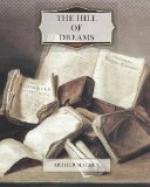He had been working steadily for some weeks, well enough satisfied on the whole with the daily progress, glad to awake in the morning, and to read over what he had written on the night before. The new year opened with faint and heavy weather and a breathless silence in the air, but in a few days the great frost set in. Soon the streets began to suggest the appearance of a beleaguered city, the silence that had preceded the frost deepened, and the mist hung over the earth like a dense white smoke. Night after night the cold increased, and people seemed unwilling to go abroad, till even the main thoroughfares were empty and deserted, as if the inhabitants were lying close in hiding. It was at this dismal time that Lucian found himself reduced to impotence. There was a sudden break in his thought, and when he wrote on valiantly, hoping against hope, he only grew more aghast on the discovery of the imbecilities he had committed to paper. He ground his teeth together and persevered, sick at heart, feeling as if all the world were fallen from under his feet, driving his pen on mechanically, till he was overwhelmed. He saw the stuff he had done without veil or possible concealment, a lamentable and wretched sheaf of verbiage, worse, it seemed, than the efforts of his boyhood. He was not longer tautological, he avoided tautology with the infernal art of a leader-writer, filling his wind bags and mincing words as if he had been a trained journalist on the staff of the Daily Post. There seemed all the matter of an insufferable tragedy in these thoughts; that his patient and enduring toil was in vain, that practice went for nothing, and that he had wasted the labor of Milton to accomplish the tenth-rate. Unhappily he could not “give in”; the longing, the fury for the work burnt within him like a burning fire; he lifted up his eyes in despair.
It was then, while he knew that no one could help him, that he languished for help, and then, though he was aware that no comfort was possible, he fervently wished to be comforted. The only friend he had was his father, and he knew that his father would not even understand his distress. For him, always, the printed book was the beginning and end of literature; the agony of the maker, his despair and sickness, were as accursed as the pains of labor. He was ready to read and admire the work of the great Smith, but he did not wish to hear of the period when the great Smith had writhed and twisted like a scotched worm, only hoping to be put out of his misery, to go mad or die, to escape somehow from the bitter pains. And Lucian knew no one else. Now and then he read in the paper the fame of the great litterateurs; the Gypsies were entertaining the Prince of Wales, the Jolly Beggars were dining with the Lord Mayor, the Old Mumpers were mingling amicably and gorgeously with the leading members of the Stock Exchange. He was so unfortunate as to know none of these gentlemen, but it hardly seemed likely that they could have done




